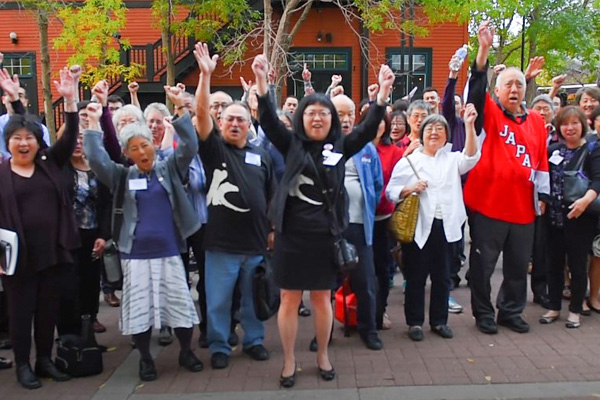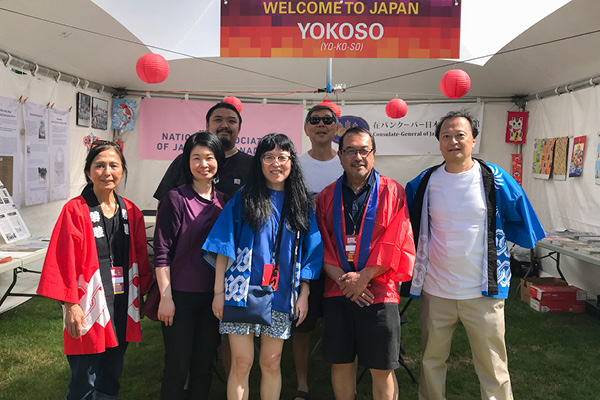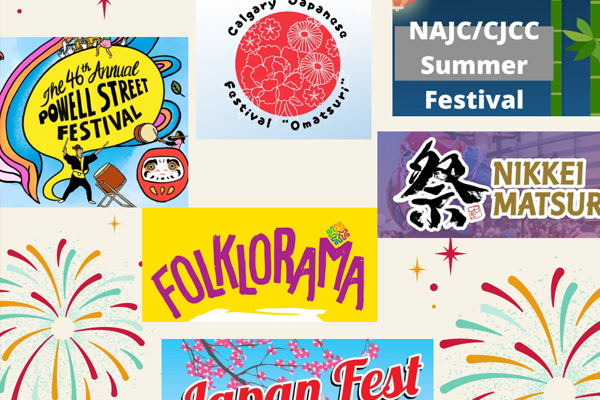by Lorene Oikawa
I was pleased to speak at this year’s Keirokai in Metro Vancouver. When I was president of the GVJCCA, it was one of my favourite hosting duties, to pay tribute to our Japanese Canadian elders. It continues to inspire me when I see so many Japanese Canadian seniors attending. During the entertainment I could see them swaying to the contemporary music and some participating in the traditional Radio Taiso and Tankō Bushi. I was reminded that Tankō Bushi is a Japanese folk dance about coal mining. The dance mimics movements made by workers in the mines such as digging the coal and pushing a cart of coal. Tankō Bushi is also known as a Bon Odori dance, performed during Obon festivals which pay tribute to the spirits of departed ancestors. How appropriate for my mother’s side of the family who came to Canada in the 1800s and worked in the coal mines in Cumberland. Thank you to the Satsuki Kai Japanese Dance Group for guiding us in the dance moves. Thank you to all the wonderful performers and volunteers especially lead volunteer GVJCCA Board Director April Shimizu, and GVJCCA President Judy Hanazawa for continuing this important tradition.
One of the messages I shared at Keirokai is the importance of sharing our stories. I urged everyone to document their family stories so they wouldn’t have regrets about missed opportunities. The National Association of Japanese Canadians (NAJC) is committed to ensuring that the stories of Japanese Canadians are known and not forgotten. Japanese Canadian history is an important part of Canadian history, and yet, our stories are often not included. The lessons of history are also important for today and for future generations so that the injustices are not repeated. This is one of the reasons why our work on BC Redress is so personal for us and one of our priority initiatives. We recently met with the BC government who received our report of findings from the community consultations we held last year. We are building on the collection of ideas and working on a strong evidence-based proposal.
On April 1st, 1949, four years after the Second World War ended, Japanese Canadians were finally allowed to return to the West Coast and given the franchise, the right to vote. 2020 will mark the 71st anniversary. The NAJC will be co-publishing with the Canadian Centre of Policy Alternatives a collection of articles about the BC Government and the Dispossession of Japanese Canadians (1941-1949) written by Dr. John Price. We will have more information posted on our website, najc.ca later this month.
Currently on our website, najc.ca/najc-statement-regarding-wetsuweten-territory, you will find our statement in solidarity with the Wet’suwet’en people. The NAJC supports non-violent actions and call on all levels of government to meet with all affected Indigenous peoples and to come to a peaceful resolution now, and to work toward a greater understanding for future relationships.
Keep an eye out for our next NAJC newsletter. We will have an article about two of our respected Japanese Canadian elders, Setsuko Thurlow and Dr. Henry Shibata, who attended the Enthronement Ceremony for the Emperor of Japan. Birthday celebrations for Emperor Naruhito took place recently. The Emperor was born on February 23 during the Year of the Rat. We thank Setsuko and Henry for representing Japanese Canadians, and look forward to hearing about the Sokui-no-Rei Seiden-no-gi for the new Emperor and the Reiwa era.
Happy March! Some of the days we are commemorating: Hinamatsuri, Girls’ Day on March 3, International Women’s Day on March 8, and International Day for the Elimination of Racial Discrimination on March 21.



